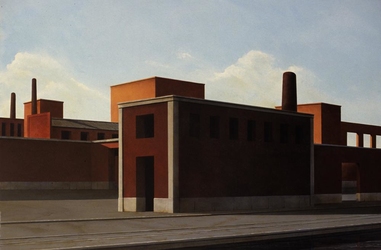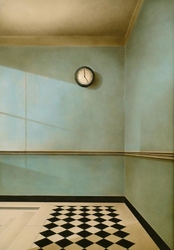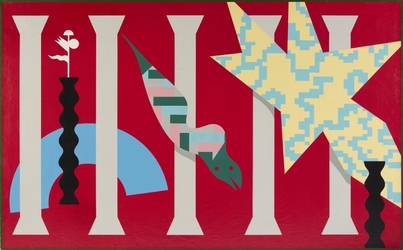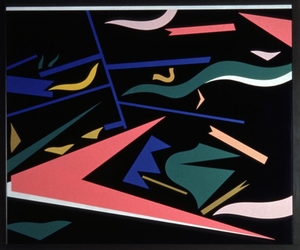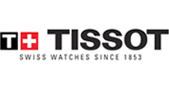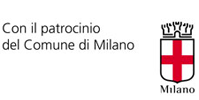Arduino Cantafora | Alessandro Mendini - Things, Houses, Cities
Galleria Antonio Colombo
Via Solferino, 44
MILANO
- 12
- 13
- 14
- 15
- 16
- 17
April 2016
Antonio Colombo Arte Contemporanea is proud to present Cose, Case, Città (Things, Houses, Cities), the double personal exhibition of the artists Arduino Cantafora and Alessandro Mendini, curated by Ivan Quaroni. The show brings together works from various periods, that embody different aspects, even counterposed, of the Postmodern visual culture on the border between art and architecture.
Both architects, artists and writers, but also refined intellectuals, Alessandro Mendini and Arduino Cantafora test themselves, through their works, in a rapid confrontation of styles, languages and antithetical obsessions.
Two souls of Postmodernism, that of Mendini, Post-Avant-Garde and Neo-Futuristic, and that of Cantafora, anachronistic, retrospective, classic: the former looks ahead, invents the concepts of Cosmesi Universale (Universal Cosmetics) and Design Pittorico (Pictorial Design), the latter returns to the craft, to the relationship with the optical reality.Two souls, the Neomodern and the traditional, that have coexisted in Postmodernism, as well as the Transavanguardia, the Anacronisti, the Citazionisti and the Nuovi Nuovi did before, embodying the various aspects of the same attitude towards the re-proposal and the re-thinking of the history of art.
On show, Arduino Cantafora's paintings of silent city views from the series Domenica Pomeriggio (Sunday Afternoon), next to the complex compositions of the Teatri Di Città (City Theatres) and a selection of smaller works dedicated to interior views. Alessandro Mendini, instead, will exhibit works on wood and on canvas, painted with a special nitro paint, some objects and prototypes, as well as a series of drawings from the past years. His works will be included in a site-specific polychrome wall painting.
Student and collaborator of Aldo Rossi until 1978, with a background deeply rooted in the scientific interest for a lucid and rational realistic reproduction, Arduino Cantafora has painted works in which not only the urban architecture, but also the domestic interiors, the objects and the places are described with an impressive rigor and an extraordinary technical precision.
Architect, professor and writer – among his writings it is worth remembering at least Quindici Stanze Per Una Casa, published by Einaudi – Arduino Cantafora is the author of a clean painting, optically exact, often imbued with melancholy and mercurial moods. His paintings, that range from urban views to architectural allegories, from bourgeois interiors to old steam locomotives, show that at the basis of his modus pingendi there is always a deep humanistic interest in the morphological study of the forms.
Influenced by Caravaggio and by the Lombard painting of the Sixteenth and Seventeenth centuries, but also by Divisionismo, Purismo and Metafisica, Arduino Cantafora's figurative language is the outcome of a deeply personal memorial path, that starts from a heartfelt adherence to optical data in order to rebuild the individual and collective historical identity. An attitude, this one, that he later translated in a didactic practice at the École Polytechnique Fédérale in Lausanne and at the Academy Of Architecture in Mendrisio, where he addressed the various issues related to the problem of representation. “I have always hoped, during my years of teaching,” the artist confessed, “to be able to contribute to the pleasure of seeing things, to the wonder of the vision as a factor of inalienable individual freedom, that, in grasping during the arc of the day and of the seasons the chasing of the light, can meet the ever identical to itself joy of being”.
Architect, designer, theorist and writer, Alessandro Mendini has spent his childhood in a bourgeois house designed by Piero Portaluppi, surrounded by the works of the greatest Italian artists of the Twentieth century collected by his relatives. This visual imprinting, fundamental to his training, was then joined by a lively passion for drawing. After graduating in architecture, he starts to work at Studio Nizzoli, but in 1970 he leaves design to direct the magazines “Casabella”, “Modo” and “Domus”, through which he spreads his renovation ideas in design. At the end of the Seventies he joins the Alchimia Studio, the radical design group that in the Eighties rewrites the rules of designing in an anti-functionalist sense, focusing on the production of objects of pure pleasure, prototypes, furniture, interiors, installations and furnishings inspired by kitsch aesthetics and Folk Art.
In design, as well as in architecture, Mendini approaches design as art and art as a project, creating strange contamination between painting and architecture and inventing provocative concepts like such as Design Pittorico, Artigianato Informatico (Computerized Craftsmanship) and Architettura Ermafrodita (Hermaphrodite Architecture).
Following a paradoxical logic, in fact, Mendini moves the conceptual approach of design and architecture to painting, while instilling in them the emotional impulse of art. “Given design's insufficiency to face the world,” he writes in 1986, “it is replaced by painting, that becomes a work without beginning, without end and without explanation, a formalist network of styles and visual references, similar to a wave breaking”.
His objects, as well as his paintings, are marked by the invention of a personal alphabet made up of abstract forms, modeled on the reinterpretation of the languages of the Modernist and Futurist avant-gardes. In his drawings, instead, surfaces Mendini's ironic and poetic soul, prone to the creation of visual stories suspended between the sketch and the project, eternally torn between the need to build and the desire to dream.
info@colomboarte.com
www.colomboarte.com
0229060171
Exhibition
Exhibition
Exhibition
Exhibition
Exhibition
Exhibition
 Find the event
Find the event on map





